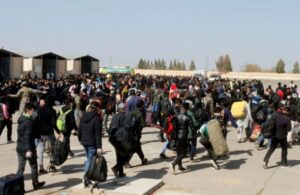BAZARAK (SW) – A number of livestock farmers in Panjshir, worried about the lack of a market to sell their dairy products, say that this situation has discouraged them from working in the livestock sector.
Khal Murad Ebrahimi, a livestock farmer in Dara-e Panjshir district, says that he can hardly provide for the needs of his 10-member family with the low amount of income he earns from the sale of dairy products.
“Every family keeps cows and goats. We don’t sell any of our dairy products and we only sell yogurt and cheese. Cheese is 40 Afghanis per kilograms and melted butter is for 2,400 Afghanis. There is no trade union,” he added.
Sohrab, another livestock farmer, says that if the government supports the livestock farmers and provides the basis for the sale and standard processing of the dairy products, they can export the products of Panjshir to other countries. He expresses the problems that livestock farmers are faced with: “The necessary food is not delivered to the animals. There is no medicine for them. Unfortunately, in vitro fertilization is not available in Panjshir. They buy agricultural cows for a lot of money; a market should be created for them. There is a market in Annaba, but I am sure that not even 50% of the dairy products are native.”
These livestock farmers want the officials of the Directorate of Agriculture, Irrigation and Livestock of Panjshir to create a suitable market for selling their dairy products.
Fazlullah Dewbandi, head of the directorate says that this department does not have enough funds to distribute milk collection machines. “22,231 liters of milk worth more than 600,000 Afghanis have been produced in Panjshir. Unfortunately, we don’t have the budget to establish milk processing centers and we have distributed animal feed and clover seeds through partner institutions.”
Multan Zarawar, an expert in livestock affairs, says that supporting livestock farmers and providing a proper market for their dairy products can provide the basis for the growth of domestic production.
“Government should establish the farmers’ union and establish centers for collecting dairy products, distribute concentrated feed for cattle and activate mobile clinics. This way, animal breeding should promote through in vitro fertilization,” he emphasized.
Animal husbandry forms a large part of Afghanistan’s economy, and many citizens, especially in remote areas, are engaged in this sector and in this way meet their livelihood needs.






